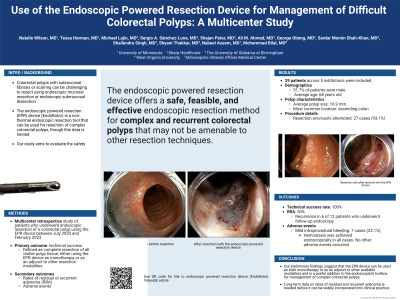Tuesday Poster Session
Category: Interventional Endoscopy
P3699 - Use of the Endoscopic Powered Resection Device for Management of Difficult Colorectal Polyps: A Multicenter Study
Tuesday, October 24, 2023
10:30 AM - 4:00 PM PT
Location: Exhibit Hall


Natalie Wilson, MD
University of Minnesota
Minneapolis, MN
Presenting Author(s)
Natalie Wilson, MD1, Tessa Herman, MD1, Michael Lajin, MD2, Sergio A. Sánchez-Luna, MD3, Shajan Peter, MD3, Ali Ahmed, MD3, George Obeng, MD4, Momin Shah-Khan, MD4, Shailendra Singh, MD4, Shyam Thakkar, MD4, Nabeel Azeem, MD1, Mohammad Bilal, MD5
1University of Minnesota, Minneapolis, MN; 2Sharp Healthcare, San Diego, CA; 3Basil I. Hirschowitz Endoscopic Center of Excellence, The University of Alabama at Birmingham Heersink School of Medicine, Birmingham, AL; 4West Virginia University, Morgantown, WV; 5Minneapolis VA Medical Center, Minneapolis, MN
Introduction: Colorectal polyps with submucosal fibrosis or scarring can be challenging to resect using endoscopic mucosal resection or endoscopic submucosal dissection. The endoscopic powered resection (EPR) device (EndoRotor) is a non-thermal endoscopic resection tool that can be used for resection of complex colorectal polyps, though this data is limited. Our study aims to evaluate the safety and efficacy of this device for the resection of scarred or fibrotic colorectal polyps.
Methods: This was a multicenter retrospective study of patients who underwent endoscopic resection of a colorectal polyp using the EPR device between July 2020 and February 2023. Preliminary data had previously been reported at the Digestive Disease Week conference in 2023. Patient demographics, procedural data, and information regarding surveillance colonoscopy were collected. The primary outcome was technical success which was defined as complete resection of all visible polyp tissue, either using the EPR device as monotherapy or as an adjunct to other resection modalities. Secondary outcomes were rates of residual or recurrent adenoma (RRA) and adverse events.
Results: A total of 29 patients across five institutions were included. 51.7% of patients were male and the average age was 68 years old. The average polyp size was 16.9 mm and the most common location was the ascending colon. Resection was previously attempted in 27 cases (93.1%).
The technical success rate was 100%. The EPR device was used as monotherapy for polyp resection in 15 cases (51.7%) and as an adjunctive therapy in 14 cases (48.3%). The RRA was 50% with recurrence in 6 of 12 patients who underwent follow-up endoscopy. Mild intraprocedural bleeding occurred in 7 cases (24.1%). Hemostasis was achieved endoscopically in all cases. No other adverse events occurred. Additional patient, polyp, and procedural details are summarized in Table 1.
Discussion: The EPR device offers a safe, feasible, and effective endoscopic resection method for complex and recurrent colorectal polyps that may not be amenable to other resection techniques. Our preliminary findings suggest that the EPR device can be used as both monotherapy or as an adjunct to other available modalities and is a useful addition to the endoscopist’s toolbox for management of complex colorectal polyps. Long-term data on rates of residual and recurrent adenoma is needed before it can be widely incorporated into clinical practice.
Disclosures:
Natalie Wilson, MD1, Tessa Herman, MD1, Michael Lajin, MD2, Sergio A. Sánchez-Luna, MD3, Shajan Peter, MD3, Ali Ahmed, MD3, George Obeng, MD4, Momin Shah-Khan, MD4, Shailendra Singh, MD4, Shyam Thakkar, MD4, Nabeel Azeem, MD1, Mohammad Bilal, MD5. P3699 - Use of the Endoscopic Powered Resection Device for Management of Difficult Colorectal Polyps: A Multicenter Study, ACG 2023 Annual Scientific Meeting Abstracts. Vancouver, BC, Canada: American College of Gastroenterology.
1University of Minnesota, Minneapolis, MN; 2Sharp Healthcare, San Diego, CA; 3Basil I. Hirschowitz Endoscopic Center of Excellence, The University of Alabama at Birmingham Heersink School of Medicine, Birmingham, AL; 4West Virginia University, Morgantown, WV; 5Minneapolis VA Medical Center, Minneapolis, MN
Introduction: Colorectal polyps with submucosal fibrosis or scarring can be challenging to resect using endoscopic mucosal resection or endoscopic submucosal dissection. The endoscopic powered resection (EPR) device (EndoRotor) is a non-thermal endoscopic resection tool that can be used for resection of complex colorectal polyps, though this data is limited. Our study aims to evaluate the safety and efficacy of this device for the resection of scarred or fibrotic colorectal polyps.
Methods: This was a multicenter retrospective study of patients who underwent endoscopic resection of a colorectal polyp using the EPR device between July 2020 and February 2023. Preliminary data had previously been reported at the Digestive Disease Week conference in 2023. Patient demographics, procedural data, and information regarding surveillance colonoscopy were collected. The primary outcome was technical success which was defined as complete resection of all visible polyp tissue, either using the EPR device as monotherapy or as an adjunct to other resection modalities. Secondary outcomes were rates of residual or recurrent adenoma (RRA) and adverse events.
Results: A total of 29 patients across five institutions were included. 51.7% of patients were male and the average age was 68 years old. The average polyp size was 16.9 mm and the most common location was the ascending colon. Resection was previously attempted in 27 cases (93.1%).
The technical success rate was 100%. The EPR device was used as monotherapy for polyp resection in 15 cases (51.7%) and as an adjunctive therapy in 14 cases (48.3%). The RRA was 50% with recurrence in 6 of 12 patients who underwent follow-up endoscopy. Mild intraprocedural bleeding occurred in 7 cases (24.1%). Hemostasis was achieved endoscopically in all cases. No other adverse events occurred. Additional patient, polyp, and procedural details are summarized in Table 1.
Discussion: The EPR device offers a safe, feasible, and effective endoscopic resection method for complex and recurrent colorectal polyps that may not be amenable to other resection techniques. Our preliminary findings suggest that the EPR device can be used as both monotherapy or as an adjunct to other available modalities and is a useful addition to the endoscopist’s toolbox for management of complex colorectal polyps. Long-term data on rates of residual and recurrent adenoma is needed before it can be widely incorporated into clinical practice.
Disclosures:
Natalie Wilson indicated no relevant financial relationships.
Tessa Herman indicated no relevant financial relationships.
Michael Lajin indicated no relevant financial relationships.
Sergio A. Sánchez-Luna: ASGE - Fujifilm Research Grant Award – Grant/Research Support.
Shajan Peter indicated no relevant financial relationships.
Ali Ahmed indicated no relevant financial relationships.
George Obeng indicated no relevant financial relationships.
Momin Shah-Khan indicated no relevant financial relationships.
Shailendra Singh indicated no relevant financial relationships.
Shyam Thakkar indicated no relevant financial relationships.
Nabeel Azeem: Boston Scientific – Consultant.
Mohammad Bilal: Boston Scientific – Consultant.
Natalie Wilson, MD1, Tessa Herman, MD1, Michael Lajin, MD2, Sergio A. Sánchez-Luna, MD3, Shajan Peter, MD3, Ali Ahmed, MD3, George Obeng, MD4, Momin Shah-Khan, MD4, Shailendra Singh, MD4, Shyam Thakkar, MD4, Nabeel Azeem, MD1, Mohammad Bilal, MD5. P3699 - Use of the Endoscopic Powered Resection Device for Management of Difficult Colorectal Polyps: A Multicenter Study, ACG 2023 Annual Scientific Meeting Abstracts. Vancouver, BC, Canada: American College of Gastroenterology.

